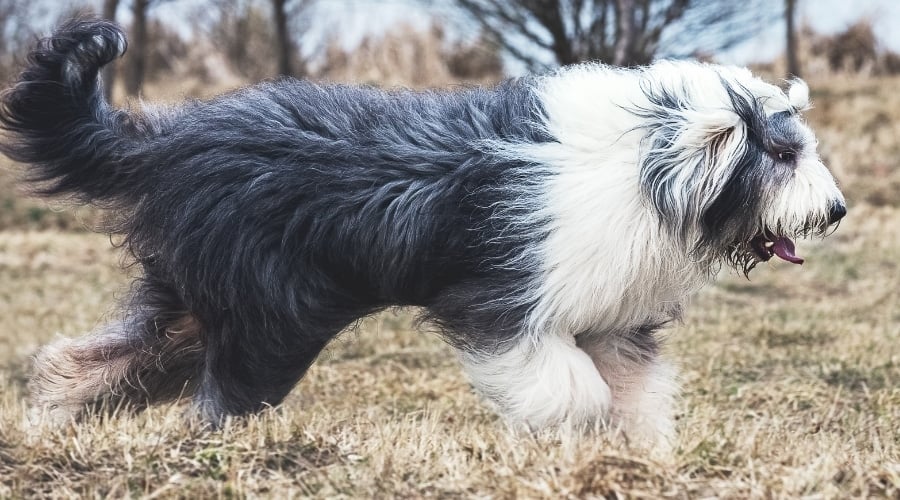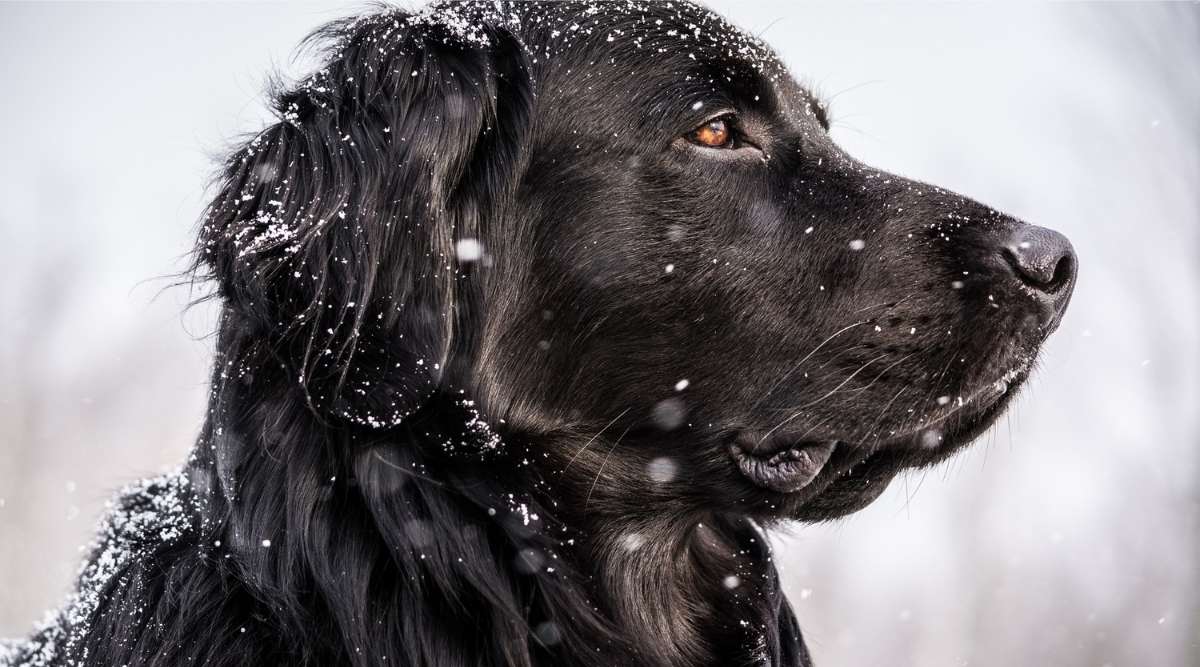Shih Tzu Pomeranian Mix Breed Information: Shiranian Facts, Traits, Pictures & More
When you purchase through links on our site, we may earn a commission. Here’s how it works.
The Shiranian is one-half Shih Tzu and one-half Pomeranian, and it is one of the cutest and newest designer doggy mixes to consider for your family. You might not have heard of them, but they combine the traits of these two popular and family-friendly pups. Shiranians have a thick, fluffy double coat and look like miniature lions. They also go by other names like Pomshi, Shih-Pom, Pom-Tzu, and Shih-A-Pom.
Table of Contents
Shiranians are sweet and loving and consider themselves a huge part of the family. They don’t like being left alone for long, and they can be pretty intense characters that stick to you like glue. Thankfully, their charismatic and fun nature means that most wouldn’t have it any other way. They might inherit a stubborn streak from their Pom parent, but the Shih Tzu influence makes them much simpler to train.
If you’re considering becoming a Shiranian owner, you’ve come to the right place. We explore everything you need to know about them, such as their personality, exercise needs, grooming requirements, puppy price, and more. They are adaptable and make excellent first-time dogs, but you need to know a few things about them first. Let’s take a closer look.
History
It isn’t clear when the first Shiranian was born, but they were likely created during the late 20th century, like most newer mixed breeds. To get a better understanding of the Shiranian, it’s essential to understand more about their parent’s history.
Shih Tzu

The Shih Tzu is playful, affectionate, and outgoing, and they are one of the largest dogs out of all the toy breeds.According to the American Kennel Club (AKC), they consistently rank in the top 20 breeds in the U.S. Shih Tzus weigh between 9 and 16 pounds and measure between 9 and 10.5 inches tall, from paw to shoulder.
Shih Tzus originate from China and were bred as lap warmers and companions for the royal family. The Imperial breeders of the Chinese emperor likely created them by mixing the Lhasa Apso and the Pekingese, making them one of the original mixed breeds. Shih Tzu translates into “lion dog,” and they were kept hidden from the world until the 1930s. Once dog lovers discovered them, they became popular worldwide very quickly. They entered the AKC’s stud book in 1969, and as they say, the rest is history.
Pomeranian
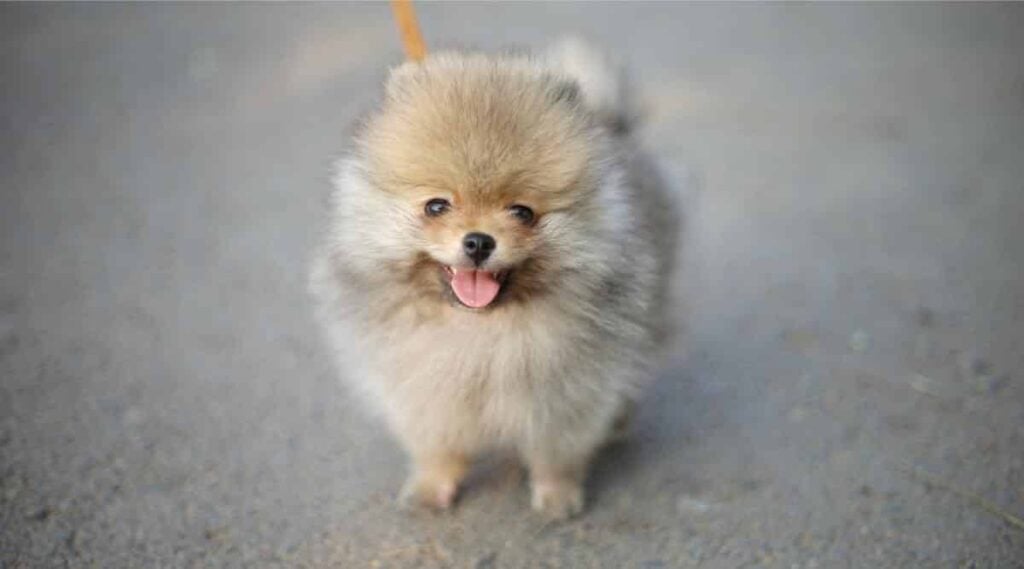
A Pom’s iconic small and fluffy frame is just one of the many characteristics owners love about them, and they consistently rank in the top 25 breeds in the U.S. Poms weigh between 3 and 7 pounds and measure between 6 and 7 inches. They originate from northeastern Europe, which was known as Pomerania but is now known as Poland.
The Pomeranian is related to the powerful sled dogs of the Arctic but a super miniature version. They were bred down from large spitz-type dogs and are the smallest spitz breed. They became popular after Queen Victoria fell in love with the breed on her travels through Europe. She took them back to Britain and became a crucial player in breeding and competing them. She’s also credited for reducing their size from 30 pounds down to what they are now.
Temperament
Shih Tzu Pomeranian mixes are very affectionate with their family and love cuddling on the sofa. Poms and Shih Tzus like to be on your lap and at the center of everything you do, so expect the Shiranian to be the same. This might not make a good match if you don’t want a dog to join you on the sofa or be your second shadow. They can suffer from separation anxiety and don’t like to be left alone for too long.
Although they are very pleasant and friendly, they might inherit a suspicious streak from their Pom parent. They typically aren’t very vocal, but some might be noisy when overexcited or quick to sound the doggy alarm when someone rings the doorbell. However, once you invite someone into the family home, they’ll greet them with excitable licks and roll over for belly rubs. So they don’t make great guard dogs.
Shiranians are little pocket rockets, and they love to play. Sure, they are wonderful lapdogs, but they also expect lots of entertainment and games throughout the day. There’s never a dull moment with a Shiranian, and they are small, amusing companions. If they feel they aren’t getting enough attention, they’ll nudge you for it. It would be best to remind kiddos to play with them gently and respectfully. They are not toys or teddy bears, no matter how much they look like one.
Size & Appearance
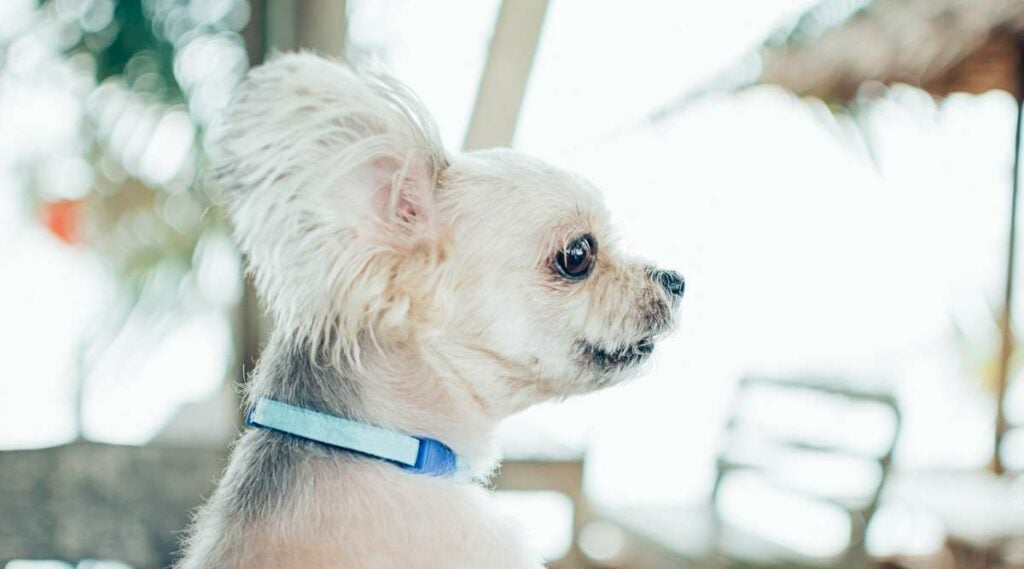
They typically weigh between 6 and 12 pounds and measure between 7 and 9 inches tall. Unlike pedigree breeds, there is no breed standard for a Shiranian, so they might differ slightly from this size. But if they vary too much, they might be another Pomeranian mix or Shih Tzu mix. They should always be an extra small to small pup.
Shiranians have sweet but mischievous smiles with darkly colored round eyes. Although small, they have a surprisingly athletic and sturdy body compared to other small breeds. They usually have small, triangular floppy ears, but some have erect ears like their spitz relatives. Like any mixed breed, they could look more like one parent than the other, and their appearance can vary from pup to pup.
Coat & Colors
The Shiranian’s coat is full and luscious. It usually has a slight wave like the Shih Tzu but is much fluffier and fuller like the Pom’s coat. They often resemble little lions. There is some speculation that a Shih Tzu is hypoallergenic, but they are not a hypoallergenic breed. Shiranians have a double coat like both parents, so this is not an ideal choice for families with allergies.
Shiranians come in all sorts of colors, thanks to their parents’ extensive coat color collection. Their colors include blue, black, cream, chocolate, orange, white, red, brindle, and liver. They can have sable hairs, which are lighter at the root and darken at the tip, or have merle markings. Some pups also have a dark mask on their face and different color patches on their body. There often can be so many colors to choose from and tons of variety in a single litter.
Exercise & Living Conditions
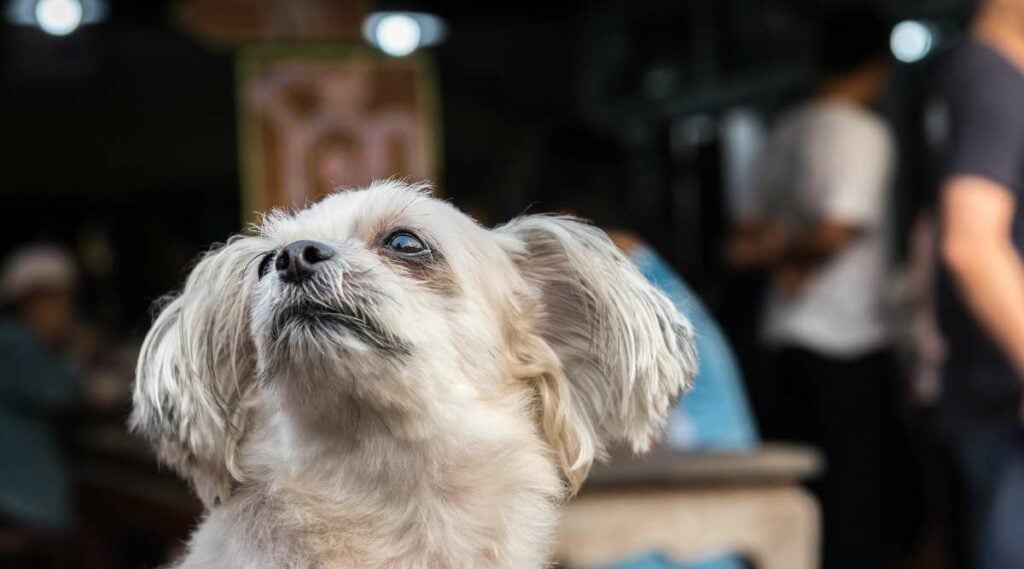
Shiranians are a mix of chill and fun and have moderate energy levels. They need around 30 minutes of exercise daily, and one or two short walks a day are plenty if they have enough playtime at home. But they can accommodate more exercise if you want an active partner. However, don’t expect them to hike mountains with you. Most Shiranians love squeaky dog toys or puzzle toys that provide treats and are a way to avoid destructive behaviors that stem from boredom.
Their small size and adaptable personalities make them ideal for small apartments or city dwellers. At the same time, they’d be happy to live in a large home. They’d appreciate a yard to play in, but this isn’t necessary as long as you walk them daily. Shiranians have a curious side like their Pom parent, so your home and yard must be secure with no places to escape.
Training
Shiranians are eager to please and very smart, which makes training generally easy. However, they might inherit a stubborn streak, so you need to be consistent with training. Thankfully, their Shih Tzu influence makes them a top choice for first-time dog owners. If you have never trained a dog before, or your pup has a particularly stubborn streak, you may want to consider getting online dog training for guidance.
Shiranians need early socialization if you want them to become well-balanced pets. Introduce them to as many dogs, humans, and new experiences as possible from a young age. These pups respond best to positive reinforcement training, so make every experience positive. Shiranians love treats, toys, and praise, making it simple to reward them.
As Shiranians don’t like to be left alone for too long, crate training is a really good idea. Crates give dogs a safe space to relax, and it also means they don’t have free reign of your home when you aren’t there, keeping them safe. Be patient and give them time to become familiar with their crate. Picking the right size crate is the key to success.
Health

Shiranians are healthy dog breeds with a typical lifespan of 11 to 17 years. To keep your Shiranian as healthy as possible, it’s essential to keep up to date with their vaccinations and health checks and keep them healthy with high-quality nutrition and daily exercise. Like all dogs, a few health conditions run in the family, so it’s important to consider pet insurance to help offset the sometimes high costs of ongoing or emergency vet care.
Eye Conditions
The most common eye problems to be aware of are cataracts, progressive retinal atrophy, retinal detachment, and dry eye. Dry eye, also known as keratoconjunctivitis sicca, is common in the Shih Tzu breed, and there is a chance your Shiranian could experience it. It occurs when the cornea and surrounding tissues become inflamed and sore due to inadequate tear production. Daily medication is usually enough to treat it, but it might require surgical correction in severe cases. If you notice dry, red, or unusual discharge around the eyes, take your pup to the vet as soon as possible.
Cardiac Concerns
Cardiac concerns are primarily seen in the Pom bloodline, so your Shiranian could inherit them. These include mitral valve disease, patent ductus arteriosus, and dilated cardiomyopathy. Regular health checks allow early diagnosis, but symptoms include excessive coughing, loud breathing, exercise intolerance, fatigue, and collapse. Although heart problems can be serious and lead to heart failure, they are usually manageable.
Patellar Luxation
Patellar luxation is mainly seen in small dog breeds, and it is an orthopedic condition that is commonly referred to as a floating kneecap. Symptoms include kicking out, hopping, or weakness. Most dogs who experience it only require corrective management by your vet, where they slip it back into place. However, reoccurring or severe cases might require surgery.
Nutrition
As small breeds, Shiranians don’t need much food, but they do require dog food crafted specifically for small breeds. How much you feed them depends on their age, size, activity level, gender, and the type of food you give them. Be sure to follow the feeding instructions according to the food packaging. It’s important not to overfeed your Shiranian, as extra weight puts additional stress on their cardiac system and joints.
Feeding your pup a high-quality diet is imperative. It must meet the basic pet food nutritional guidelines set by the Association of American Feed Control Officials (AAFCO), and the package should state this. Look for high-quality ingredients such as animal-based protein, healthy carbs, omega fatty acids, vitamins, and minerals. Why not consider one of the leading fresh food subscriptions for your Shiranian, such as The Farmer’s Dog?
Grooming
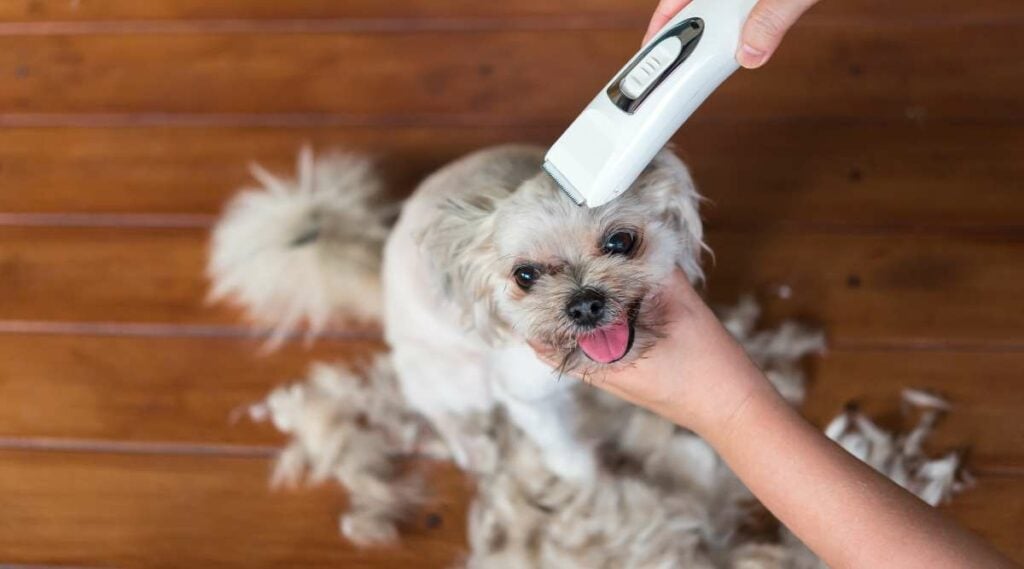
Brush them several times a week to keep them tangle and mat-free. A slicker brush and an undercoat rake are essential grooming tools for this pup. They only need a bath once every two months or so, maybe more if they get filthy. Their hair is likely to be thick, so you must dry them thoroughly after each wash to prevent sores and infections.
Shiranians have compact mouths, and their teeth become tightly packed together. Ideally, brush their teeth daily to keep their gums and teeth healthy. Start their dental regime from a young age so they become used to it. Shih Tzu mix breeds sometimes suffer from dog tear stains, so keep them clean with specially designed wipes for doggy eyes.
Breeders & Puppy Costs
Shiranians are an uncommon mix, and you might need to spend extra time researching and finding a reputable breeder. Work with a responsible breeder who breeds healthy dogs and can provide you with relevant health certificates. It’s also important to know that you’re buying a Pomeranian and Shih Tzu mix, not just any mixed breed. Make yourself aware of the tactics used by irresponsible breeders and puppy mills, and avoid them.
The average price of a puppy Shiranian from a reputable breeder can range between $600 and $1,200. Many factors influence puppy prices, such as bloodline, parent registration, demand, location, etc. Be wary if you find a Shiranian puppy for much less or more than this price. Remember the additional costs of prepping your home for a puppy and everything they need, such as supplies and healthcare.
Rescues & Shelters
Shiranians are rare hybrids, so finding one in a rescue shelter is much harder than other, more popular mixed breeds. Visit your local shelters and speak to the staff about your search for a Shiranian. If they don’t have one, they might know a nearby shelter that does. You can also search for Shiranians online via rescue organization websites. They list dogs needing homes nationwide, so keep an eye on these sites, too.
As A Family Pet
- Shiranians are small, toy-sized mixed breeds that can inherit traits from either parent.
- They love to be cuddled and involved with everything you do.
- Separation anxiety might become a problem if you leave them alone for too long.
- These pups are sweet, loving, loyal, and a bit cheeky.
- Training is relatively simple for first-time dog owners.
- They need around 30 minutes of exercise a day.
- Feed them a small-breed, life-stage appropriate dog food.
- Keep them healthy with regular vet checkups.
- Shiranians are second shadows and stick to their family members like glue.
- They can live in tiny homes and generally do well with other pets and children.
- Shiranians can be vocal but don’t make good guard dogs.
- Keep their coat healthy with regular grooming.
What Else Should I Consider Before Adopting A Dog?
The Shiranian is a cute and fun little lapdog who wants nothing more than to be part of the family. They need a family who can stay with them most of the day, giving them cuddles and lots of fun interaction. Their exercise and nutritional needs are simple, and they are adaptable and relatively simple to train. If you’re new to the dog universe, we have some tips and questions you may want to ask yourself about owning a dog before you take the leap. Dog ownership is a big responsibility, so you want to make sure you’re prepared.
